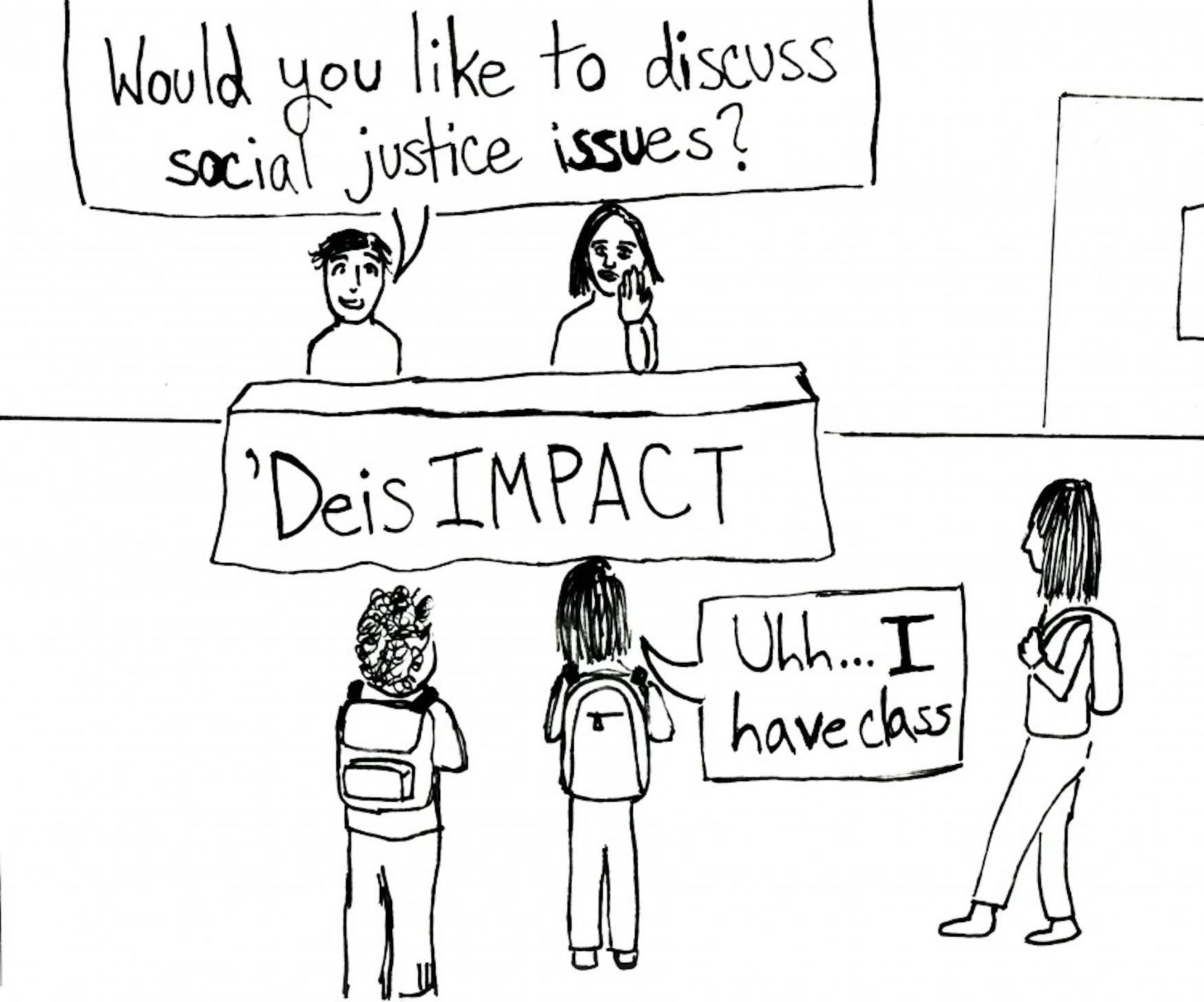EDITORIAL: University is falling down on its social justice mission
This year’s ’DEIS Impact, Brandeis University’s annual social justice festival, featured 52 events. Unfortunately, this is the most impressive thing one can say about ’DEIS Impact. Though the festival’s name suggests that attendees should walk away with some sense of how Brandeis students can make an impact — either on the University itself or on society as a whole — the majority of its events provide little guidance to that end. This shortcoming, however, is only one of the reasons the festival as a whole is so poorly attended.
’DEIS Impact events tend to suffer from one or more drawbacks. Too many are simple lectures, never a promising format for attracting students hoping to get off their chairs and actively effect change. Most occur during the day, and while the prospect of learning about the “theoretical frameworks” on self-awareness and “cross-identity dialogue” may be intriguing to some, it is unlikely to draw many students away from concrete concerns such as homework and jobs. Additionally, many events — such as talks about the anthropology of power and the various drivers of global migration patterns — suffer from being overly theoretical. Considering the many widespread, easy-to-comprehend problems in the United States that need addressing, ’DEIS Impact can only be seen as a missed opportunity to equip students with the skills to help out. According to a 2017 report by the USDA, 11.8 percent of American households face insecurity insecurity. This year’s festival focused on “exploring oppression, power, [sic] and privilege.” Why was there no room for a workshop on food insecurity and the racial and economic imbalances that contribute to it?
It’s not as though the administration is lacking in infrastructure to build on. Students participating in the Waltham Group regularly engage in the important work of distributing food, tutoring students in need of extra support and addressing homelessness. A few of this year’s ’DEIS Impact events, such as Saturday’s “Housing Insecurity in Waltham and Beyond,“Fit in nicely with the Waltham Group’s focus on achieving local and tangible impacts.
Future ’DEIS Impact festivals should be focused on hightlighting Brandeis’s existing programs for advancing social justice and increasing participation in the Waltham Group, instead of holding numerous lecture events based on yearly themes. Another effective and obvious change would be to reduce the overwhelming number of programs and move the remaining ones to the evening, when students can actually attend them. Furthermore, lectures should be replaced by workshops whenever possible to increase interest and participation. Ultimately though, the festival’s attendance will remain low unless events are geared to students’ interests and abilities, not faculty and administrators’ projects. 2019’s ’DEIS Impact theme was “What is Social Justice?: Consciously Exploring Oppression, Power, and Privilege in our Communities”; this board is more curious as to why an event titled “’DEIS Impact” appears more fixated on analyzing terms than on solving real problems.
Even if the University did understand its purported values, its celebration of those values conflicts ironically with its celebration of Black History Month. At Brandeis, February is many things: the start of midterm season, a week off and ’DEIS Impact. This month is overcrowded, and we tend to lose track of February’s designation as the time to commemorate Black history, culture, accomplishments and people. This board calls on the University to refocus on the contributions of Black students and scholars to the University and the larger world. Black History Month should not be treated as a niche occasion, remarked on only by the African and African American Studies Department and the Black student groups on campus. Instead, it should be given institutional attention and recognition. Why are students not introduced to the BLK Archives at orientation? Why is the Intercultural Center the only place on campus where such conversations are always encouraged?
This board calls on the University to hold an annual school-wide Black History Month commemoration. The event should be big, it should be proud, it should embrace Black history as absolutely integral to the school’s identity and mission. The University should, each year, honor a different event or figure in Black history. The honoree or commemoration would be chosen for its relevance to current events, and in their opening remarks, the University president could elaborate on how it ties into the University’s ongoing goals each year.
Brandeis seeks to be a social justice-oriented school, and, though the University may not be clear on what that means, this board holds that celebrating Black History Month is an integral part of that mission.
While this board urges the University to meaningfully recognize and celebrate Black History Month, it commends the active expansion of the AAAS Department with its most recent hiring of Dr. Amber Spry as an Assistant Professor. Additionally, the Department just celebrated its 50th anniversary through a weekend full of programming, which this board commends the University for. However, the program should still be strengthened by expanding the number of courses available and admitting more applicants who express an interest in majoring or minoring in AAAS. Additionally, there could be a University Writing Seminar focused on Black writers so that first-year students gain a basic understanding of Black history and an interest in AAAS. Ultimately, the University’s self-proclaimed values of social justice will only come to fruition once it realizes the power of ethnic studies and makes a substantive effort to continue the expansion of the AAAS department.



Please note All comments are eligible for publication in The Justice.